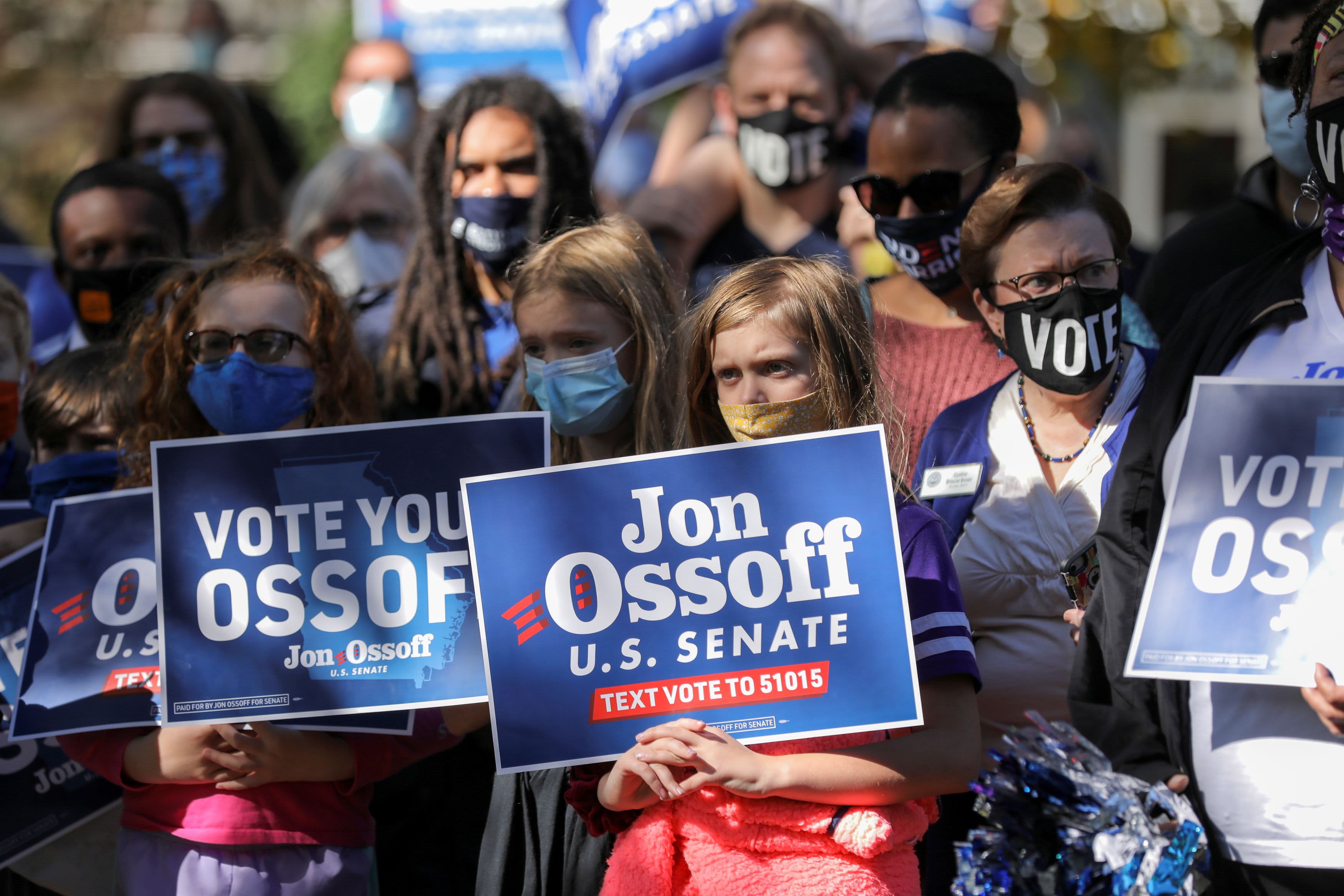Supporters listen as Democratic U.S. Senate candidate Jon Ossoff speaks at a news conference in Grant Park after the election in Atlanta, Georgia, U.S. November 6, 2020.
Dustin Chambers | Reuters
Wall Street and Washington are operating these days on the assumption that Republicans will retain control of the Senate after at least one Republican wins a seat in the Jan. 5 Senate runoffs in Georgia.
It seems reasonable to expect that Democrats won’t win both races as they are being outspent by their GOP opponents and many people prefer split government in this highly polarized era, even in a state in the process of turning blue.
However, Georgia surprised the nation and went for Joe Biden in the presidential election.
Stacey Abrams, the influential Democratic politician who delivered Georgia to Joe, is working hard to get both Democratic senatorial candidates to the upper chamber.
Georgia could then surprise the markets come January if it pulls off another upset. Contrary to popular Wall Street wisdom, that might just be good for the markets.
Why do I bring this up, you might ask?
Well, the conventional wisdom suggests that even if Democrats take control of the Senate, the narrow victory will mean that a Biden administration will be constrained in setting a new agenda.
Lacking a clear mandate, and sufficient votes, the new administration will tack to the center and make only marginal changes in tax law, stimulus plans, infrastructure spending and health-care reform.
Not so fast, I say.
Spending trumps higher taxes?
Barring GOP control of the Senate, even the narrowest margin of control going to the Democrats leaves them an option to be far more ambitious in taxing and spending than is currently believed. And while higher taxes are anathema to risk markets, much higher spending could more than offset that potential negative, possibly overwhelming tax hikes with spending plans that boost both employment and corporate profits.
The budget reconciliation process, which can be used by the smallest majority, allows any administration to pass large scale programs with a single vote advantage in the Senate, as long as the legislation is deficit neutral … kind of. (I’ll get to that eventually.)
The reconciliation process says that budget bills, including increases in the federal debt limit and any other spending plans, requires only a one-vote victory in the Senate to pass, while debate is limited, and the filibuster cannot be used.
The Trump administration, for instance, used the reconciliation process to pass its $1.5 trillion tax cut and managed, somehow, to avoid the requirement that it not increase the deficit.
In other words, like the Trump administration, and other administrations before it, reconciliation can be used to achieve many Biden goals under current rules.
However, it’s a moot point if the Republicans win just one of the Georgia runoffs.
Mitch McConnell would remain as Senate majority leader and would force the Biden administration, at least so it is believed, to abandon ambitious plans to spend trillions more on relief, stimulus and infrastructure; constrain any expansion of the Affordable Care Act; or radically overhaul any other government programs.
If, however, the Democrats manage to take the Senate, I would bet that a President Biden and Vice-President Harris, who represents the tie-breaking vote in the Senate, may not feel as constrained as many currently suggest.
A 50-50 Senate doesn’t guarantee the Democrats an easy road to reform, with moderates like Joe Manchin, D-W.Va., in the mix, but it opens the door considerably. Factor in, too, that Sen. Chuck Schumer, D-N.Y., could face a progressive primary challenge in 2022, which may force him to embrace a more liberal approach.
So, while I am burying the lede, for those who believe that a single vote majority in favor of Democrats limits their ability to raise taxes, increase spending and expand the ACA, think again.
Single party rule has its advantages which, in this case, as in other administrations, may surprise many in Washington but will most certainly surprise many, many more on Wall Street.
